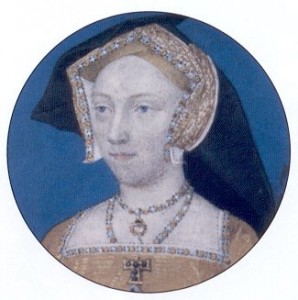 At 9am on 20th May 1536, just one day after the execution of his second wife, Anne Boleyn, Henry VIII became betrothed to Jane Seymour, daughter of Sir John Seymour, soldier and courtier, and of Margery Wentworth. Jane had served both of the King’s previous wives as a lady-in-waiting, having come to court in around 1529.
At 9am on 20th May 1536, just one day after the execution of his second wife, Anne Boleyn, Henry VIII became betrothed to Jane Seymour, daughter of Sir John Seymour, soldier and courtier, and of Margery Wentworth. Jane had served both of the King’s previous wives as a lady-in-waiting, having come to court in around 1529.
Eustace Chapuys, the imperial ambassador, wrote to Seigneur de Granvelle informing him of the betrothal:
“Has just been informed, the bearer of this having already mounted, that Mrs. Semel [Seymour] came secretly by river this morning to the King’s lodging, and that the promise and betrothal (desponsacion) was made at 9 o’clock. The King means it to be kept secret till Whitsuntide; but everybody begins already to murmur by suspicion, and several affirm that long before the death of the other there was some arrangement which sounds ill in the ears of the people; who will certainly be displeased at what has been told me, if it be true, viz., that yesterday the King, immediately on receiving news of the decapitation of the putain entered his barge and went to the said Semel, whom he has lodged a mile from him, in a house by the river.1
It is clear from Chapuys’ letter that the King’s relationship with Jane was hot gossip and that it had caused some suspicion because of the fact that it must have started before Anne was dead. Even Chapuys, who refers to Anne as “the putain” (wh*re) appears to disapprove of the King rushing to see Jane after he’d heard that Anne was dead. As to Chapuys’ views on Jane, here is what he said in a letter to Antoine Perrenot:
“She is sister of one Edward Semel[Seymour], … of middle stature and no great beauty, so fair that one would call her rather pale than otherwise. She is over 25 years old. I leave you to judge whether, being English and having long frequented the Court, “si elle ne tiendroit pas a conscience de navoir pourveu et prevenu de savoir que cest de faire nopces.” Perhaps this King will only be too glad to be so far relieved from trouble. Also, according to the account given of him by the Concubine, he has neither vigour nor virtue; and besides he may make a condition in the marriage that she be a virgin, and when he has a mind to divorce her he will find enough of witnesses. The said Semel [Seymour] is not a woman of great wit, but she may have good understanding (un bel enigm, qu. engin?). It is said she inclines to be proud and haughty. She bears great love and reverence to the Princess. I know not if honors will make her change hereafter.”2
Chapuys doubts that Jane is a virgin, thinks she is “proud and haughty” and lacking in intelligence, BUT she loves and respects Henry’s daughter, Mary. It’s not a very complimentary description, is it?
Notes and Sources
- LP x. 926
- LP x. 901